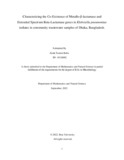Characterizing the Co-Existence of Metallo-β-lactamase and Extended Spectrum Beta-Lactamase genes in Klebsiella pneumoniae isolates in community wastewater samples of Dhaka, Bangladesh.

View/Open
Date
2022-09Publisher
Brac UniversityAuthor
Rafia, Zarin TasnimMetadata
Show full item recordAbstract
Background: The co-existence of MBL and ESBL in Gram-negative bacteria poses greater risk
in public health and limit the range of treatment choices, even with β-lactams which is the most
widely used class of antibiotics. Untreated wastewater from hospitals increasing the opportunities
to transfer the antibiotics resistance gene between pathogens which ultimately reach communities
and poses health risks. Metallo-β-lactamase (MBL), that is one type of carbapenems enzyme,
exhibit the ability to inactivate all classes of β-lactams antibiotics. With discovering of blaNDM-1
gene, a novel β-lactamase, produced the New Delhi Metallo- β-lactamase, poses a larger threat as
this gene usually found along the side of other genes that provide resistance to almost all
antibiotics. This blaNDM-1 gene is easily transferable between Enterobacteriaceae. ESBL is another
commonly found enzyme of Enterobacteriaceae that inactivate cephalosporins and monobactams.
Both these genes are important to be identified and prevention of their spread.
Materials and Methods: Wastewater samples were collected from 18 sites in Dhaka and
transferred to the laboratory. Bacterial cultures were grown on selective agar media for isolation
of Klebsiella pneumoniae. Antibiotic resistance profiles of colonies were determined with Kirby Bauer disc diffusion testing with PCR identification of MBL encoding genes, blaNDM-1, and blaIMP,
as well as ESBL encoding genes, blaSHV, blaTEM, and blaCTX-M.
Results: From this study it can be perceived that, 29.88% of Klebsiella pneumoniae which were
either imipenem or meropenem resistant or both of antibiotic resistant, most of them carried the
blaNDM-1 or blaSHV gene which is the most common gene responsible for coding the MBL & ESBL
enzyme known as Metallo-beta-lactamase that makes bacteria resistant to a broad range of beta lactam antibiotics.
